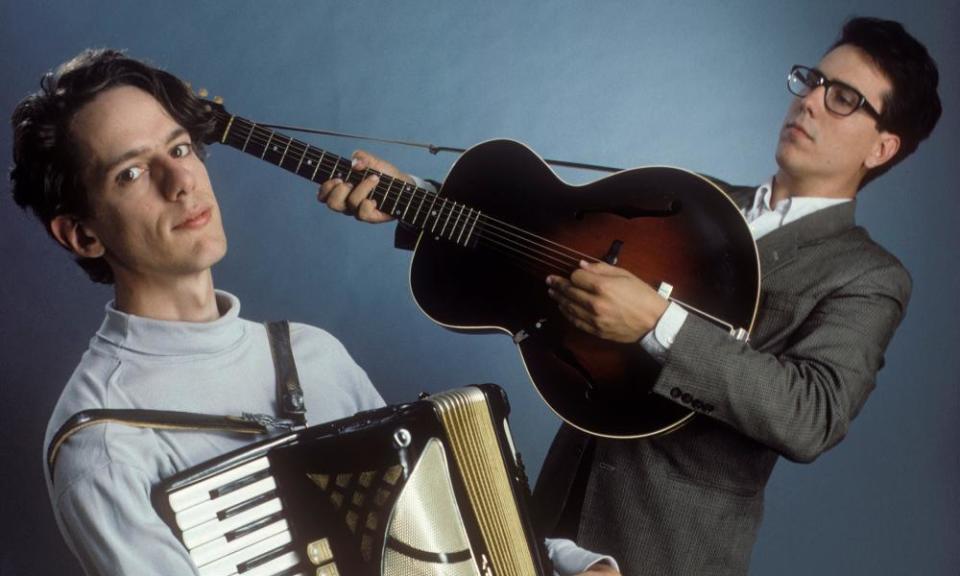‘I wrote it from the perspective of a night light’: How They Might Be Giants made Birdhouse in Your Soul

John Linnell, vocals, keyboards, songwriter
We had played the showcase night at New York’s CBGB, but didn’t stand out, so we tried instead playing alongside performance artists in East Village. People showing up to watch avant garde performance art bought our cassette, and we became part of this groovy little scene of really enthusiastic people.
After some indie success, major labels were suddenly coming along like buses wanting to sign us. We opted for Elektra because they were nice people and didn’t seem to want to change us. They gave us a list of potential producers. We knew Clive Langer and Alan Winstanley from their work with Madness, and, weirdly, as a teenager I had seen Clive’s band Deaf School on their US tour. I told Clive the gig was hilarious and fun. I think that’s the reason they agreed to produce us.
I’d written the melody and beginnings of Birdhouse in Your Soul some years earlier, but when we started working with the producers in 1989 I was still in the process of arranging it. It was just a rough verse and a chorus. I’d made a demo using a drum machine and put the snare drum on the off beat, but when I made another demo I changed it to the sort of classic rock beat I thought might get us on the radio. To their credit, Clive and Alan said: “No! Go back to what it was.” They said I had made it sound “just like any other pop song”, and they were right.
The summer we recorded it in New York it was very hot, and we were inspired by the Lovin’ Spoonful’s Summer in the City – we copied its chords for our guitar part.
The lyrics were stream of consciousness. I was in my apartment in Williamsburg, Brooklyn, and wrote it from the perspective of a night light serenading the occupant of its room. I wasn’t thinking too hard. It was just intended as a dummy lyric, but it ended up as the finished song. People seemed to find it really innocent or charming.
Before we appeared on the Johnny Carson show, the scrupulous bandleader made us rehearse it several times using a metronome, but for the actual performance the count had somehow been set 10 beats-per-minute faster. It was hard to sing that fast, but it gave it a nervous energy.
The song cemented my decision to never sing in an affected accent. I sang in my own voice and when it was played on the radio in the UK someone rang in to say how irritating she found it that I was doing a fake, thick American accent. It was hilarious.
John Flansburgh, guitarist, songwriter
I would never have dared to try to write a song if it wasn’t for Elvis Costello and the Ramones. Those people getting in the charts opened the way for the likes of us and changed my life. The performance art scene was about partying our brains out, living in the moment and doing interesting things.
Before we got noticed we did this thing called Dial-a-Song to get our music heard. You basically rang a phone number and heard a song free of charge. A really embryonic version of Birdhouse in Your Soul was on Dial-a-Song as a one-minute demo a good year before we signed to Elektra.
Before we got noticed we did this thing called Dial-a-Song to get our music heard. You basically rang a phone number and heard a song for free
When we met Clive and Alan they were at the height of their cultural influence. I think the label thought: “We’ve got this impossible band that will never work on the radio. We’ll give them to these triple-cool producers.” Working with them was a masterclass and they gave us this beautifully cinematic production.
Birdhouse has real instruments on it but also drum machines and sequenced bass. We built up the whole arrangement without guitars, but Clive and Alan let me add this big Marshall stack guitar part, to give me something to do. On Top of the Pops I just bounced around playing a guitar.
Back then, sampling was the preserve of rich musicians like Duran Duran, but Casio had just brought out the budget FZ-1 sampling synth, which made sampling available to ordinary musicians. While we were making Birdhouse, De La Soul were across town making 3 Feet High and Rising with the same keyboard. You could do stuff like hit a mallet on a fridge, capture it and play it. So we had all these eccentric sounds.
I sampled the trumpet part from a very successful record, but to get round the copyright laws we got the trumpet player in and paid him for two days’ work while he performed it again, note for note.
I’m completely happy that we fall within the noble tradition of one-hit wonders in the UK. It’s a different kind of song and has a strange effect on people. When we last played Birdhouse in London, some in the audience started crying.
They Might Be Giants’ new album, Book, is out now, as well as a 144-page clothbound, hardcover art book of the same name

 Yahoo News
Yahoo News 